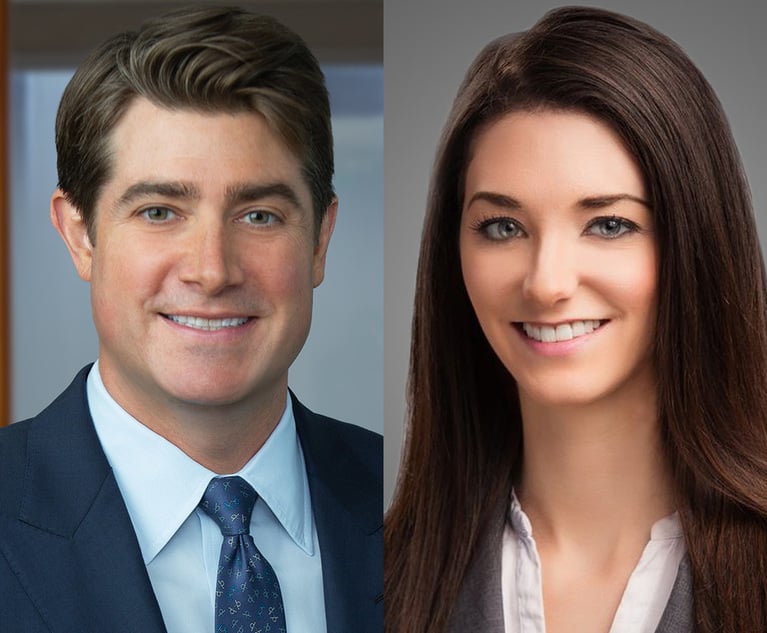Are Bank Practices Finally Seeing a Rebound Amid the Pandemic Response?
"We're at a critical, unique juncture for the financial services industry itself," said Mark Chorazak, a Shearman partner.
June 16, 2020 at 05:58 PM
5 minute read
 Credit: Bigstock
Credit: Bigstock
Financial regulatory work in the U.S. has been slower the last few years, in part due to the Trump administration rolling back rules and enforcement for banks enacted after the last financial crisis.
But partners representing banks say they're now anticipating an uptick in work due to the economic turmoil and various credit and loan programs created during the pandemic. Meanwhile, the outcome of the next presidential election has the potential to create another practice swing.
"We're at a critical, unique juncture for the financial services industry itself," said Mark Chorazak, who joined Shearman & Sterling earlier this month as a partner in its financial institutions advisory and financial regulatory practice in New York.
Chorazak, most recently at Cadwalader, Wickersham & Taft, advises financial clients on such matters as the Bank Holding Company Act, the Dodd-Frank Wall Street Reform and Consumer Protection Act and other U.S. banking laws. Although work in his practice area has been a bit slower in the last few years, he said he expects work to pick up as financial institutions prepare for post-pandemic realities.
"Once the pandemic ends, we will likely see new and increased supervisory scrutiny and regulatory requirements," he said, adding clients are "anticipating a different reality after this pandemic we're living in. Everything flowing from it will create new demands for regulatory counsel."
Specifically, Chorazak said he expects there to be increased supervisory scrutiny placed on financial institutions in the coming months, including more congressional oversight on banks due to the pandemic, and work stemming from federal government loan programs.
Barney Reynolds, head of Shearman's financial services industry group, said his firm is already seeing heightened demand for financial regulatory advice from existing clients navigating the coronavirus economy. "There are an awful lot of deals, restructurings and bankruptcies, and financial institutions are at the heart of it all," he added.
Other firms are also reporting upticks in banking practice activity. Witold Balaban, global co-chairman of Latham & Watkins' financial institutions industry group, said his team has been navigating clients through business disruptions, regulatory matters and product structuring challenges as a result of the pandemic.
"In the wake of COVID-19, we've been advising clients on critical areas such as accessing the Federal Reserve's various emergency funding facilities, as well as issues related to operational resilience, restructuring, conduct and culture, litigation and more," he said in an email.
He said "a major area of focus" is safely guiding clients through LIBOR transition issues and the U.S. Securities and Exchange Commission's Regulation Best Interest requirements, a standard of conduct requiring broker-dealers' recommendations to be in the best interest of retail customers.
In addition to working on pandemic-related matters, Balaban said the Latham team was already advising clients on various technological advances that are changing the financial regulatory sector.
"Demand for savvy counsel who can advise on the evolving regulatory landscape regarding digitization of financial services and digital assets, including crypto assets, continues to grow," he said.
A 'seasonal' practice
At Simpson Thacher & Bartlett, bank regulatory partner Keith Noreika said this area of the law was "seasonal," and while the demand for financial regulatory counsel is always there to some extent, the current financial crisis highlights that need.
"Policymakers have done incredible work to put in place security programs to turn on the emergency liquidity authority of the Federal Reserve and Congress, which has resulted in a lot of work for those who do what I do," said Noreika, a former acting comptroller of the currency.
In April, his work was focused on navigating the government's immediate economic response to the pandemic, as issuers needed help accessing capital markets, small businesses needed help applying for Paycheck Protection Program loans, and midmarket companies needed help with the Main Street Lending Program.
"However, this won't be a continuing practice," he said, adding that as the country slowly begins to reopen, the strength of the financial sector may promote a return to more market activity and typical M&A transactions.
"I get a sense that we're not far away from going back to more normal, and the inertia will come back, coupled with an added regulatory angle—loan forgiveness, forbearance, and congressional and attorney general investigations that will come given the amount of money the government has put into the marketplace," he said.
But even as firms report seeing more financial regulatory work, or at least expect to, the activity isn't yet creating soaring demand for lateral hires. Ross Weil of Walker Search said he hasn't yet seen an increased appetite for financial regulatory lawyers, but he pointed out that the pandemic's disruption of the hiring market may present an opportunity for some lawyers looking to make a move.
Shearman's recent partner hiring of Chorazak, he said, "demonstrates the reality" among so much uncertainty: "You still need to have a strong bench in that practice area, both now as well as in the new normal."
This content has been archived. It is available through our partners, LexisNexis® and Bloomberg Law.
To view this content, please continue to their sites.
Not a Lexis Subscriber?
Subscribe Now
Not a Bloomberg Law Subscriber?
Subscribe Now
NOT FOR REPRINT
© 2025 ALM Global, LLC, All Rights Reserved. Request academic re-use from www.copyright.com. All other uses, submit a request to [email protected]. For more information visit Asset & Logo Licensing.
You Might Like
View All
White & Case Crosses $4M in PEP, $3B in Revenue in 'Breakthrough Year'
6 minute read
Haynes and Boone Expands in New York With 7-Lawyer Seward & Kissel Fund Finance, Securitization Team
3 minute read
'None of Us Like It': How Expedited Summer Associate Recruiting Affects Law Students and the Firms Hiring Them

Sheppard Mullin, Morgan Lewis and Baker Botts Add Partners in Houston
5 minute readLaw Firms Mentioned
Trending Stories
- 1Munger, Gibson Dunn Billed $63 Million to Snap in 2024
- 2January Petitions Press High Court on Guns, Birth Certificate Sex Classifications
- 3'A Waste of Your Time': Practice Tips From Judges in the Oakland Federal Courthouse
- 4Judge Extends Tom Girardi's Time in Prison Medical Facility to Feb. 20
- 5Supreme Court Denies Trump's Request to Pause Pending Environmental Cases
Who Got The Work
J. Brugh Lower of Gibbons has entered an appearance for industrial equipment supplier Devco Corporation in a pending trademark infringement lawsuit. The suit, accusing the defendant of selling knock-off Graco products, was filed Dec. 18 in New Jersey District Court by Rivkin Radler on behalf of Graco Inc. and Graco Minnesota. The case, assigned to U.S. District Judge Zahid N. Quraishi, is 3:24-cv-11294, Graco Inc. et al v. Devco Corporation.
Who Got The Work
Rebecca Maller-Stein and Kent A. Yalowitz of Arnold & Porter Kaye Scholer have entered their appearances for Hanaco Venture Capital and its executives, Lior Prosor and David Frankel, in a pending securities lawsuit. The action, filed on Dec. 24 in New York Southern District Court by Zell, Aron & Co. on behalf of Goldeneye Advisors, accuses the defendants of negligently and fraudulently managing the plaintiff's $1 million investment. The case, assigned to U.S. District Judge Vernon S. Broderick, is 1:24-cv-09918, Goldeneye Advisors, LLC v. Hanaco Venture Capital, Ltd. et al.
Who Got The Work
Attorneys from A&O Shearman has stepped in as defense counsel for Toronto-Dominion Bank and other defendants in a pending securities class action. The suit, filed Dec. 11 in New York Southern District Court by Bleichmar Fonti & Auld, accuses the defendants of concealing the bank's 'pervasive' deficiencies in regards to its compliance with the Bank Secrecy Act and the quality of its anti-money laundering controls. The case, assigned to U.S. District Judge Arun Subramanian, is 1:24-cv-09445, Gonzalez v. The Toronto-Dominion Bank et al.
Who Got The Work
Crown Castle International, a Pennsylvania company providing shared communications infrastructure, has turned to Luke D. Wolf of Gordon Rees Scully Mansukhani to fend off a pending breach-of-contract lawsuit. The court action, filed Nov. 25 in Michigan Eastern District Court by Hooper Hathaway PC on behalf of The Town Residences LLC, accuses Crown Castle of failing to transfer approximately $30,000 in utility payments from T-Mobile in breach of a roof-top lease and assignment agreement. The case, assigned to U.S. District Judge Susan K. Declercq, is 2:24-cv-13131, The Town Residences LLC v. T-Mobile US, Inc. et al.
Who Got The Work
Wilfred P. Coronato and Daniel M. Schwartz of McCarter & English have stepped in as defense counsel to Electrolux Home Products Inc. in a pending product liability lawsuit. The court action, filed Nov. 26 in New York Eastern District Court by Poulos Lopiccolo PC and Nagel Rice LLP on behalf of David Stern, alleges that the defendant's refrigerators’ drawers and shelving repeatedly break and fall apart within months after purchase. The case, assigned to U.S. District Judge Joan M. Azrack, is 2:24-cv-08204, Stern v. Electrolux Home Products, Inc.
Featured Firms
Law Offices of Gary Martin Hays & Associates, P.C.
(470) 294-1674
Law Offices of Mark E. Salomone
(857) 444-6468
Smith & Hassler
(713) 739-1250










